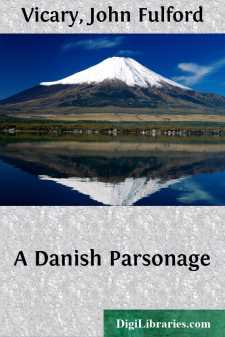Categories
- Antiques & Collectibles 13
- Architecture 36
- Art 48
- Bibles 22
- Biography & Autobiography 813
- Body, Mind & Spirit 142
- Business & Economics 28
- Children's Books 17
- Children's Fiction 14
- Computers 4
- Cooking 94
- Crafts & Hobbies 4
- Drama 346
- Education 46
- Family & Relationships 57
- Fiction 11829
- Games 19
- Gardening 17
- Health & Fitness 34
- History 1377
- House & Home 1
- Humor 147
- Juvenile Fiction 1873
- Juvenile Nonfiction 202
- Language Arts & Disciplines 88
- Law 16
- Literary Collections 686
- Literary Criticism 179
- Mathematics 13
- Medical 41
- Music 40
- Nature 179
- Non-Classifiable 1768
- Performing Arts 7
- Periodicals 1453
- Philosophy 64
- Photography 2
- Poetry 896
- Political Science 203
- Psychology 42
- Reference 154
- Religion 513
- Science 126
- Self-Help 84
- Social Science 81
- Sports & Recreation 34
- Study Aids 3
- Technology & Engineering 59
- Transportation 23
- Travel 463
- True Crime 29
A Danish Parsonage
Description:
Excerpt
CHAPTER I.
John Hardy had lived with his mother at Hardy Place. His father had died when he was six years of age, and there was consequently a long minority of fifteen years. The greatest influence in John Hardy's life was a trout stream that ran winding through an English landscape for four miles in the Hardys' property. John Hardy fished it as a schoolboy, and it was the greatest triumph he experienced as a lad, to catch more trout in it with a fly than the numerous fly-fishers to whom Mrs. Hardy's kindness gave permission. When college days came, John Hardy, ever intent on fishing, went to Norway in the vacation with the checkered result of getting an occasional salmon, and in the smaller streams on the fjelds a quantity of small trout. The grand scenery in the fjords, and the kindly nature of the people, led John Hardy to more remote districts, where sport was better, the fare and quarters worse, but some acquisition of Scandinavian language a necessity.
Thus John Hardy not only gradually acquired a knowledge of many dialects in Scandinavia, but the ability to read and understand the simpler books in the language. He travelled and fished through Norway and Sweden, and by degrees learnt, from the necessity of speaking it, more and more of the Danish language, the language of Scandinavia, as English relatively is to broad Scotch. This naturally led to his going to Denmark, and his travelling through Jutland and the Danish islands. In Jutland he accidentally fished in a West Jutland river, and to his surprise found the difficult but good fishing that his heart longed for.
John Hardy returned home, and was at Hardy Place with his mother the whole winter, and then, as April came round with the fishing season, John became restless, and told his mother of his Danish fishing experiences, and left for Copenhagen. His mother said, "Write me once a week, John, and bring me home a Scandinavian princess for your wife." John Hardy promised to write, but said he thought Scandinavian princesses did not rise to a fly. His mother's face grew grave, and she said, "You should marry soon, John; you are twenty-eight, and I want to see you married to a wife to whom you can trust Hardy Place and the care of your mother in her old age."
"I can find no one yet, dear mother," said John Hardy. "I cannot bear you should have any one at Hardy Place you did not only like but love."
"Bless you, John," said his mother. "I trust in your love; and I know some men are such gentlemen, and so was your father, and so are you, John."
So Hardy left for Copenhagen by the English steamer from Hull to St. Petersburg, and was landed in the pilot-boat at Elsinore, and went thence by rail to Copenhagen....


